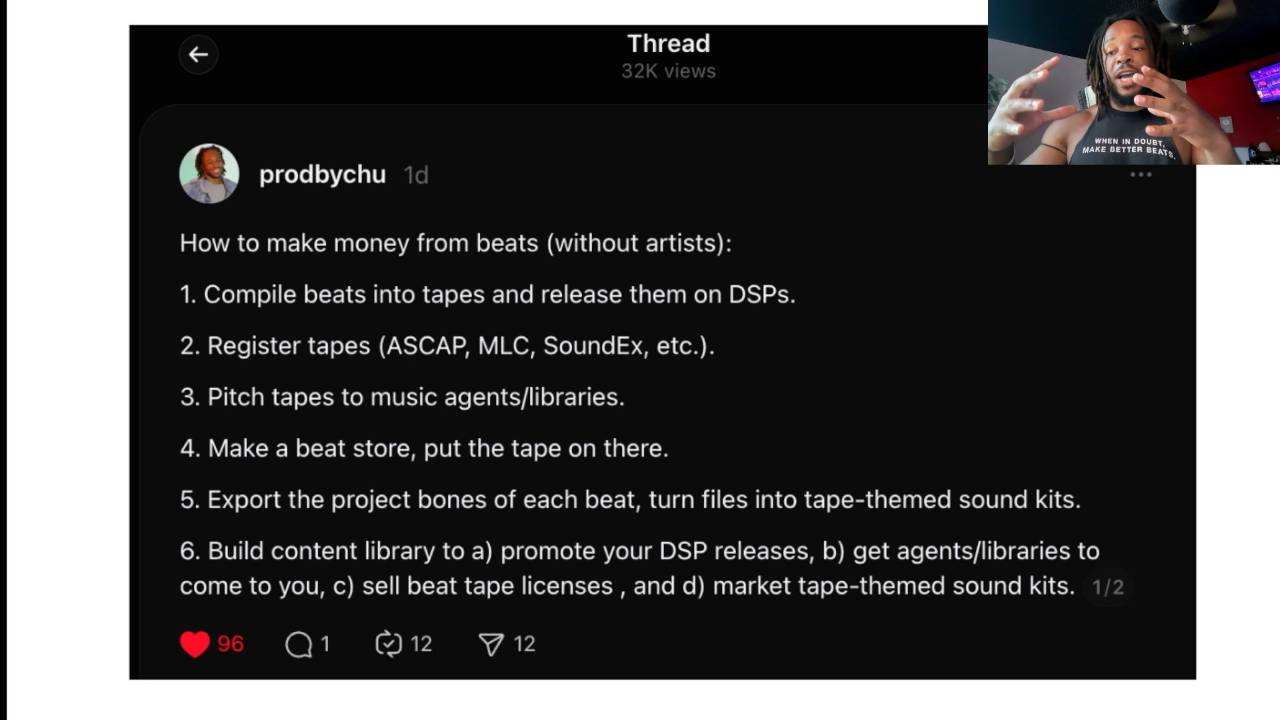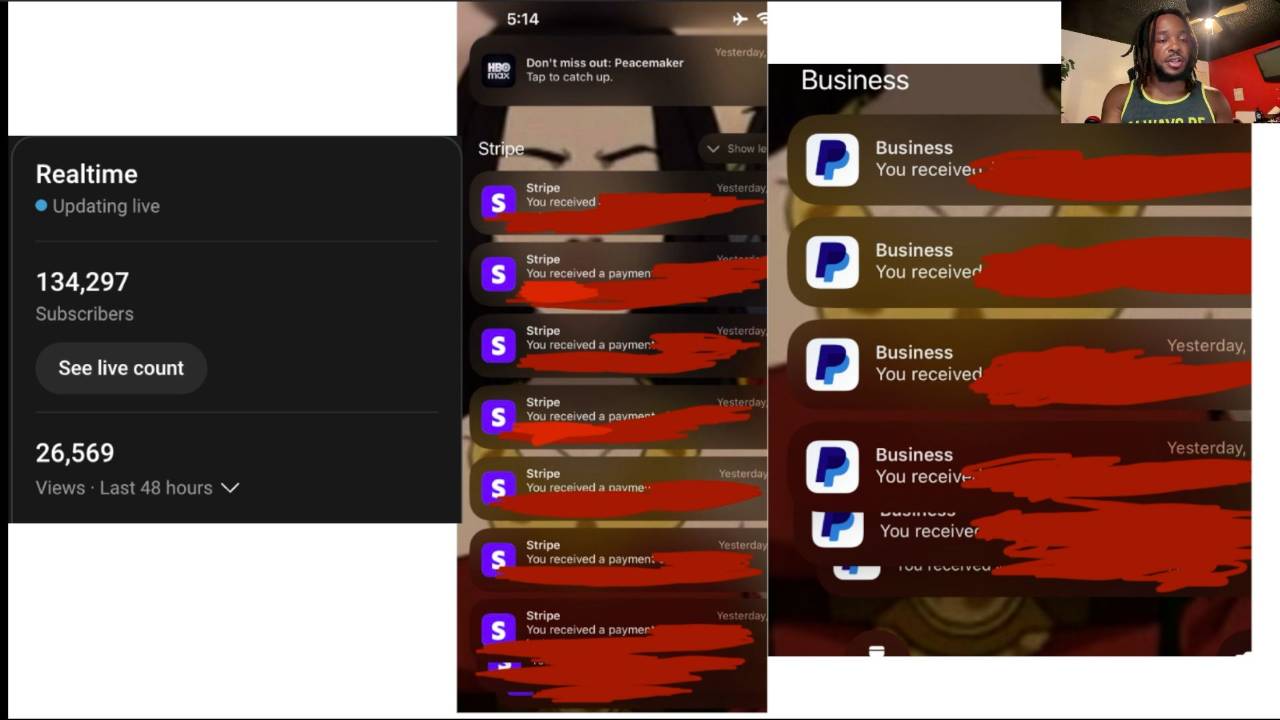
If you want to get good, put your butt in the chair 💺.

There’s no way around it homie.
none of the following will make you better;
- hours of tutorials from guys you're already better than.
- courses promising you the 'secret'
- the never ending stream of quick tips on your feeds.
Tutorials will give you more knowledge (valuable).
Courses will give you actionable systems (practically useful).
Quick tips will keep you vigilant (repetition leads to mastery).
BUT...
Nothing is going to make you better unless you sit down to actually make beats.
if you don't put it into practice, it's all wasted time.
(go watch some SpongeBob instead my guy frfr).

& I understand that someone might have told you differently, but I'm here to set the record straight for you - so you can actually grow.
The only way to practice making beats is to sit in your chair, turn your DAW on, and make beats.
This essay covers the 'system' I use to repeatedly get my butt in the chair and keep it there.
[peep my new free Melody Multi Kit, "may the force be with You"!]
1) Don't overthink anything; start with a warm up.

I like to take a 'just do it' approach to life, and this is especially helpful for making beats.
When I start any session, I jump right in.
But I don't start by making 'the beat for the day'.
I begin with playing chords and stringing notes together into random motifs.
The only goal for the first 15 to 30 minutes is getting my brain warmed up.
No; your warm up doesn't have to be half an hour.
sometimes mine is only 5 minutes tbh - the point is actually warming up.
Doing this has shown me that my musical ability is similar to fitness.
When I stretch before working out, it's always smoother (and I've never pulled a muscle on the day that I stretched first).
When I warm up before making beats, it's always smoother (and I never have 'beat block' on the days that I warmed up first).
[btw - this is a full lesson in DOPE - you can view the lecture here]
2) Next, move on to the fundamentals.
After warming up, I cook my first official beat of the day.
This beat is never anything meant to strain me creatively.
So if an artists asked me to make something out of my genre, that is not what I'm working on for this first complete session.
the only goal here is to work on techniques I'm comfortable with or want to hone.
it's for the purpose of refining skills and building confidence.
so I'm mostly only focused on practicing techniques I already have automaticity in.
[peep my new single! - 'Drift']
3) Now for the "hard" part; The Current Study.
Or, at least, the hardest part of this process.
it's should be more fun than hard 🧠.
because the rest of your beat making for the day/session should be focused on whatever topic you're studying right now.
you want to select a genre/artists/instrument/FX and make it the focal point of your STUDY.
[peep my new single! - 'Heisenberg']
The STUDY 📚.

this is the Plot.
The Method.
The Scheme.

it's simple; follow this exact plan for 30 days and you'll be better than 50% of the producers you know.
Do it for 12 months and you will be better than 80% of the producers you know.
because 80% of producers will never have access to this information.
(even if you slap them in the face with it).
And 80% of the people who read this won't do anything it says.
that's how sure I am in You, if you'll just lock tf in and T tf up homie.

1) Hacking your feed; understanding primary consumption vs. secondary consumption.
hacking your social media is key.
I have another newsletter coming that will explain how to use this one tip to become a superhero.
And there'll be a full module in DOPE this month about it too.
but for now, you just need to know that you are what you eat,
and this is true for every manifestation of your ability to consume, including the main 3 secondary habits of consumption;
- Physically, like the food you eat.
- Emotionally, like the friends you keep.
- Spiritually, like the ideas/ethic/morals you live by.
Mental consumption is the primordial germ to all of these; the primary habit of consumption.

Put less nerdy, your habits of consumption are also entities in and of themselves that consume things; and that which they eat is whatever you have stored up in your mind.
What you fertilize your mind with determines what kind of soil it will be for other appetites.
the quality of your mind soil determine the extent of quality concerning the three secondary consumption habits above.
and it's the state of the three secondary consumption habits that determines your ability to create successfully.
all this is necessary preface, because it helps you understand why it's important to manage what you consume on social media.
because all content on social media is food for your mental consumption, your primary consumption. And this will be made manifest in your life.
if you watch negative, doom ridden content that never teaches you anything, you can be sure that your life will play out similarly to that content.
HOWEVER...
if you consume educational content on your topics of interests,
- beat making (melodies, mixing, etc.).
- creativity.
- brand development.
- entrepreneurship.
and spend the majority of the rest of the time exploring media that enriches your life,
- fitness and nutrition content.
- videos/articles by doctors and therapist that help you better understand your mind and body.
- genuine comedy that isn't focused on tearing other people down (I tend to avoid anything that even smells like a commentary channel, because they're usually negative - although there are some positive ones popping up more and more).
you'll be feeding your mind with everything it needs to unlock its dormant creative potential.
2) The part where you have to make beats; understanding what hard work is (and is not).

This is when we toss all metaphysics aside.
because nothing you learn here will be meaningful unless you actually sit down to make beats.
however, it's not just about 'hard work.'
I'm a huge advocate for 'hard work'
I'm also a recovering workaholic.
So I have the perfect set of particular skills in order to let you know that the diminishing returns for 'hard work' are murderous.

that's because we have to pay attention to the output/results we get per unit of input.
you're creative reserves are kind of like a car.
the car is a great tool for transportation when it has gas.
but once the gas has run out, it immediately becomes the worst type of transportation.
because walking is better than sitting in the car 1) hoping someone with push the car with it in you, or 2) praying for gas to reappear in your tank without any effort on your part.
similarly, you have a powerful creative ability who's energy source comes from the consumption habits that we talked about above.
BUT...
even with the best habits of consumption, even with all the creative joy in the world filing you at once, you'll still run out.
it's okay, because you can just replenish with consumption and rest.
SO...
The key 🔑 is to do the least amount of work possible to get you going consistently.
Because making beats consistently is already hard work, so finding out the threshold amount of that hard work that you can handle each 24-48 hours is an important thing to do.
I recommend the pomodoro method, which is a time blocking technique. You work with no distractions for a set amount of time, and then you take a break.
Here are the time blocks I use, or have used in the past;
- Level 1 - 15 minutes, 5 minutes rest (best starting place).
- Level 2 - 25 minutes, 5 to 7 minutes rest.
- Level 3 - 45 minutes, 10 to 15 minutes rest (advanced).
I started off only being able to do 5 minutes 😂, so please don't worry about forcing yourself to do more before you're ready.
you will get there if you just trust the process.
once you can do level 1 twice in a row, then you can move on to level 2.
I would not recommend moving on to level 3 until you can do 3 to 5 reps at level 2 consistently.
don't get greedy; trust the process.
3) Easy bonus XP; How you can earn money while improving.

the ability to make beats consistently is an incredible feat.
if you can do that, you're already in the top 20% of beat makers.
(you're in the group of guys who actually do it instead of just talking about it).
To become the top 20% of this group of producers who actually do it, you just need to organize your effort.
Don't just make beats for the sake of it
(although that's not a bad thing in and of itself - I view FL Studio as a video game and often hop on just to vibe).
Create tools for yourself that improves your workflow.
You can create things like;
- Templates.
- MIDI.
- Melody loops.
- Mixer presets.
- VST banks
& these will help your session run more smoothly.
You'll be able to speed up the workflow and draw inspiration from past creative ideas.
AND...
You'll also be able to sell these 🧠.
the key is to make them for YOU.
(if it's not useful to you, it won't be worth money to anyone else).
this is the thought process behind all my sound kits - I made them for me first, then packaged them later for commercial distribution.
There are many lessons in DOPE on this, including a new full lesson on how to sell kits - members can watch here!
4) Fail safe system
This is linked to step 3 above.
You're 'bonus XP' also doubles as your fail safe plan.
This is how I never miss a day of beat making.
Even if there's a day when I absolutely don't feel like doing it at all, it's never an issue to pull up my MIDI stashes, fire up a template, and cook some heat real quick 🔥.
And since I refuse to miss a day of reps, my cord of focused, organized effort continues to grow longer and thinker.
5) Do the work
This means finished the work.
Export the beats.
(and send them to artists).
Compile the MIDI.
Upload tracks for DSP using the Spotify play from last week's letter.
Work towards the completion of everything.
Otherwise everything up until this point is just wasted time to make You feel better about not actually completing the work.
No procrastination.
No "I'll export/finish tomorrow."
Do now, go now.
Automaticity.
(look this word up)
Pretty much everything I'm teaching in DOPE this quarter revolves around the psychological concept of automaticity.
If you want some 'homework' this week that will really help you grow (even more than everyone who reads this), go look up and study this word for about 15 minutes.
Blessings,
Chu
Get Sound Kits 👇






